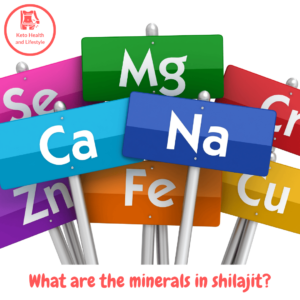This post may contain affiliate links which means I may receive a commission for purchases made through links. Learn more about policies on my about page.
Summary
Pure Himalayan Shilajit presents a remarkable opportunity to naturally increase energy levels, improve cognitive abilities, and strengthen overall vitality. By gaining a comprehensive understanding of its numerous advantages, safe application methods, and limited side effects, you can effectively harness the ancient healing properties of this Ayurvedic solution to promote your overall well-being and vitality in a confident and informed manner.
Table of Contents
Pure Himalayan shilajit is rising in popularity with its myriad of benefits for overall health and well-being. Shilajit, a potent natural substance, is gaining attention for its array of advantages that can enhance various aspects of your health.
Shilajit is a versatile substance that acts as an antioxidant, boosting your body’s immunity and cognitive functions. Additionally, it serves as an anti-inflammatory agent, an energy enhancer, and a diuretic, aiding in the removal of excess fluids from your system. These properties make shilajit a valuable addition to your wellness routine and supplement to your Ketogenic diet.
Understanding the potential benefits of shilajit is crucial for appreciating its role in supporting your health goals. From cognitive enhancement to immune system support, shilajit offers a holistic approach to improving your overall well-being. Embracing the power of shilajit could be a transformative step towards a healthier and more vibrant life.
If you’re considering starting Keto check out: what-is-strict-clean-dirty-lazy-keto and our guide on macros.
What is pure Himalayan shilajit?
Shilajit is a resin-like substance that seeps from the rocky crevices of the Himalayan Mountains. Its formation is a slow process, involving the decomposition of ancient plants over millennia, under specific climatic conditions. This natural alchemy results in a potent substance rich in fulvic acid, amino acids, and valuable minerals. Authentic shilajit is considered a panacea (universal remedy) in Ayurvedic medicine, revered for its ability to harmonise the body’s functions and promote overall wellbeing.
| Ayurvedic | A system of traditional medicine native to India |
The harvesting process
Skilled collectors trek to high altitudes in the Himalayas, carefully scraping the tar-like resin from between rock crevices. This resin is a product of years of the decomposition and compression of plant matter. The collected shilajit is then purified and processed to ensure its potency and safety for consumption, while preserving its wealth of bioactive compounds.
Boosting Cognitive Function
Shilajit, a natural substance known for its numerous health benefits, also plays a significant role in boosting cognitive function. Let’s explore how shilajit can enhance cognitive abilities and support overall brain health.
Enhancing Energy Levels
One of the key benefits of shilajit is its ability to act as an energy booster. By increasing stamina and combating fatigue, shilajit can provide a natural source of sustainable energy. Users have reported feeling more alert and focused after incorporating shilajit into their daily routine. For example, I’ve noticed a significant improvement in my mental clarity, ability to relax and sleep better since starting to take shilajit supplement from before I started the Keto diet and included pure Himalayan shilajit into my daily routine.
Aiding in Anti-Inflammatory Effects
Shilajit also boasts potent anti-inflammatory properties that can help reduce inflammation in the body. These properties make it a valuable natural remedy for managing conditions related to inflammation. Health professionals often recommend shilajit for its ability to alleviate joint pain, muscle soreness, and other inflammatory issues. National library of medication clinical studies have highlighted the effectiveness of shilajit in reducing inflammation markers in the body, promoting overall well-being and comfort.
By incorporating shilajit into your daily routine, you can not only enhance your energy levels but also benefit from its anti-inflammatory effects, supporting your cognitive function and overall health.
Supporting Immune Systems
Improving Heart Health
Shilajit has shown promising effects on heart health, with research indicating its potential to regulate blood pressure, improve circulation, and support overall cardiovascular function. A study published on Medical News Today highlighted the protective effects of shilajit on the heart, emphasising its significance in maintaining cardiovascular well-being. Ayurvedic practitioners recommend shilajit as a supplement for heart diseases due to its health-enduring properties, as reported by The Tribune India.
Promoting Detoxification
Shilajit acts as a natural diuretic, aiding in the elimination of toxins from the body and supporting overall detoxification processes. The presence of fulvic acid in shilajit plays a crucial role in detoxifying heavy metals, as discussed on Nature’s Blends. Fulvic substances in shilajit actively detoxify heavy metals, aligning with WHO and FDA standards, according to a study on PubMed. Incorporating shilajit into your detox routine can enhance the body’s natural detoxification mechanisms, providing a holistic approach to wellness.
Anti-Ageing Properties
Shilajit, a natural substance rich in minerals and nutrients, offers a range of anti-ageing benefits that can support overall health and vitality.
Enhancing Nutrient Absorption
Shilajit is known for its ability to enhance the body’s absorption of essential nutrients, vitamins, and minerals. By incorporating shilajit into your daily routine, you can boost your body’s ability to extract and utilise key nutrients, leading to improved overall health. For example, shilajit can aid in the absorption of calcium, promoting strong bones and teeth. Studies have shown that individuals using shilajit supplements experienced increased energy levels and enhanced cognitive function due to better nutrient absorption.
Managing Diabetes
Research suggests that shilajit may play a role in managing diabetes by helping to regulate blood sugar levels, improve insulin sensitivity, and support metabolic functions. Shilajit’s active compounds have shown potential in enhancing glucose metabolism and controlling blood glucose levels. Healthcare professionals recommend incorporating shilajit into a balanced diet and lifestyle regimen for individuals with diabetes to potentially help stabilise their condition. Studies have indicated the beneficial effects of shilajit on insulin sensitivity, which can aid in managing diabetes effectively.
By incorporating shilajit into your wellness routine, you can experience the anti-ageing properties it offers, from enhancing nutrient absorption to potentially aiding in the management of diabetes.
For more information on the benefits of shilajit, check out Healthline’s insights on Shilajit and Medical News Today’s article on Shilajit benefits.
Types of shilajit – how to use shilajit
Himalayan shilajit resin
A raw tar like substance. Comes in a small pot with a small spatula/spoon. A small pea sized amount is dissolved in a glass of lukewarm water daily and then drank. Known to have an earthy taste.
Shilajit dry drops
Dry drops are the same as tablets or capsules but have no fillers or additives. No measuring device needed (spatula/spoon) as the dry drops are pre measured for the correct dosage, take orally once per day. Has the same benefits as the resin.
Shilajit liquid
A thick liquid similar to the resin. 2-3 drops dissolved into warm water once per day. Some variations are extracted with mineral water. Look for pure extracted shilajit liquid with no additives.
Can you mix shilajit with coffee?
Yes, shilajit can be taken with coffee. If you have tried the resin and liquid and are not liking the taste then mix the same dosage amount into your daily coffee and consume as normal. Coffee will help to mask the taste making it more palatable.
Side effects
Everyone is different and shilajit can affect each of us in different ways.
Shilajit’s potential side effects include an upset stomach, nausea, vomiting, and diarrhoea. It can also cause vertigo and headaches in some individuals. Those with diabetes, iron disorders, and autoimmune conditions should exercise caution when consuming shilajit. Allergic reactions like rashes and itching are uncommon but possible. Shilajit may interact with certain medications, so it’s advisable to consult a doctor before use.
How long does it take for shilajit to work?
Shilajit’s effects can vary depending on the individual and the specific condition being addressed. Generally, it’s believed that shilajit may take several weeks or even months of consistent use to experience its full benefits. For certain conditions like chronic fatigue or joint pain, some people report feeling improvements within a few weeks. However, for more deep-seated issues like infertility or chronic diseases, it could take several months of regular supplementation before noticeable changes occur. It’s crucial to be patient and consistent with shilajit supplementation to allow it to work effectively. From my own personal experience, I noticed differences in my sleeping pattern in around 2 weeks. I am more relaxed and started to sleep through the night with less interruptions.
When to take shilajit
Find what suits you. I personally take the shilajit dry drops in the morning as part of my daily routine. Can I take shilajit before bed? Yes! Shilajit can be taken before bed without any issues. It’s a natural supplement that doesn’t cause stimulant effects or disrupt sleep patterns. In fact, some people find that taking shilajit at night helps them feel more rested upon waking. However, it’s best to start with a low dose and assess your individual response, as everyone may react differently.
Does shilajit break a fast?
When it comes to whether shilajit breaks a fast, the answer depends on the type of fast you are doing.
For water fasts where only plain water is consumed, taking shilajit would break the fast as it provides calories and nutrients.
For intermittent fasting or other types of fasts that allow minimal calorie intake, shilajit may be acceptable as it typically contains fewer than 50 calories per serving. It’s crucial to check the specific fasting protocol and consult with a healthcare professional, especially if fasting for medical reasons.

What are the minerals in shilajit?
| Mineral | Symbol | Role |
|---|---|---|
| Aluminium | Al | A trace mineral that plays a role in several enzymatic processes within the body. In Shilajit, aluminium helps support the overall mineral composition and balance. |
| Antimony | Sb | A trace mineral that contributes to the antioxidant properties of Shilajit, supporting cellular protection from oxidative stress. |
| Barium | Ba | Helps regulate the balance of electrolytes in the body, contributing to Shilajit’s ability to support hydration and overall cellular function. |
| Beryllium | Be | Aids in the synthesis of certain enzymes and supports the immune system, adding to Shilajit’s immune-boosting properties. |
| Bismuth | Bi | A trace mineral that may exhibit antimicrobial properties, contributing to Shilajit’s potential ability to combat harmful bacteria. |
| Boron | B | Essential for bone health and the metabolism of certain minerals, enhancing Shilajit’s support for healthy bones and joints. |
| Calcium | Ca | A critical mineral for maintaining strong bones, teeth and supporting muscle function. Shilajit’s calcium content contributes to overall bone health. |
| Carbon | C | A critical component of organic molecules in Shilajit, playing a crucial role in forming fulvic and humic acids. |
| Cerium | Ce | A rare earth element in Shilajit that supports cellular function and contributes to the overall mineral balance. |
| Chromium | Cr | Essential for glucose metabolism and insulin sensitivity, supporting healthy blood sugar levels and energy production in Shilajit. |
| Cobalt | Co | Necessary for producing vitamin B12, vital for maintaining healthy nerves and red blood cells. Its presence in Shilajit contributes to overall well-being. |
| Copper | Cu | An essential trace mineral involved in various enzymatic processes, supporting collagen and elastin production for healthy skin and connective tissue. It also helps maintain a healthy immune system and contributes to the antioxidant properties of Shilajit. |
| Dysprosium | Dy | A rare earth element in Shilajit that contributes to mineral composition and balance. |
| Erbium | Er | Another rare earth element in Shilajit, contributing to the mineral balance and overall composition. |
| Europium | Eu | A rare earth element in Shilajit that plays a role in the mineral balance and composition of the substance. |
| Fluorine | F | Essential for maintaining healthy teeth and bones. Its presence in Shilajit contributes to overall bone health. |
| Gadolinium | Gd | A rare earth element that contributes to Shilajit’s mineral balance and composition. |
| Gallium | Ga | A trace mineral that supports enzymatic processes and immune function, contributing to the overall health benefits of Shilajit. |
| Germanium | Ge | A trace mineral that may have immune-boosting properties and support overall cellular health. Its presence in Shilajit contributes to its health-promoting effects. |
| Gold | Au | A trace mineral that may have anti-inflammatory properties, supporting Shilajit’s ability to reduce inflammation and promote overall well-being. |
| Hafnium | Hf | A trace mineral that contributes to Shilajit’s overall mineral composition and balance. |
| Holmium | Ho | A rare earth element in Shilajit that contributes to the overall mineral composition and balance. |
| Indium | In | A trace mineral that supports hormonal balance and contributes to Shilajit’s adaptogenic properties. |
| Iodine | I | Essential for thyroid function and the production of thyroid hormones, which regulate metabolism and energy levels. Its presence in Shilajit supports overall endocrine health. |
| Iridium | Ir | A trace mineral that contributes to Shilajit’s overall mineral balance and composition. |
| Iron | Fe | Essential for producing haemoglobin and transporting oxygen in the blood. Shilajit’s iron content supports healthy energy levels and overall well-being. |
| Lanthanum | La | A rare earth element that contributes to Shilajit’s mineral balance and composition. |
| Lead | Pb | Present in trace amounts in Shilajit and is carefully monitored during purification to ensure safety. |
| Lithium | Li | A trace mineral that may support mood stability and contribute to Shilajit’s overall health benefits. |
| Lutetium | Lu | A rare earth element that contributes to Shilajit’s overall mineral composition and balance. |
| Magnesium | Mg | Essential for various physiological processes, including muscle and nerve function, energy production, and protein synthesis. Its presence in Shilajit contributes to overall health and well-being. |
| Manganese | Mn | A trace mineral that supports various enzymatic processes, antioxidant activity, and bone health. It is a vital component of Shilajit’s health benefits. |
| Mercury | Hg | Present in trace amounts in Shilajit and is carefully monitored during purification to ensure safety. |
| Molybdenum | Mo | A trace mineral that supports various enzymatic processes and contributes to Shilajit’s overall health-promoting properties. |
| Neodymium | Nd | A rare earth element that contributes to Shilajit’s mineral balance and composition. |
| Nickel | Ni | A trace mineral involved in various enzymatic processes and supports overall health. Its presence in Shilajit contributes to its health-promoting effects. |
| Niobium | Nb | A trace mineral that contributes to Shilajit’s overall mineral composition and balance. |
| Osmium | Os | A trace mineral that contributes to Shilajit’s mineral balance and composition. |
| Palladium | Pd | A trace mineral that contributes to Shilajit’s overall mineral composition and balance. It may also play a role in various enzymatic processes, supporting overall health benefits. |
| Phosphorus | P | Essential for bone health, energy production, and cell function. Its presence in Shilajit supports overall well-being. |
| Platinum | Pt | A trace mineral that contributes to Shilajit’s overall mineral composition and balance. It may also have antioxidant properties, supporting cellular health. |
| Potassium | K | Crucial for maintaining proper fluid balance, nerve function, and muscle contraction. Its presence in Shilajit contributes to overall health and well-being. |
| Praseodymium | Pr | A rare earth element that contributes to Shilajit’s mineral balance and composition. |
| Rhenium | Re | A trace mineral that contributes to Shilajit’s overall mineral composition and balance. |
| Rhodium | Rh | A trace mineral that supports various enzymatic processes and contributes to Shilajit’s overall health benefits. |
| Rubidium | Rb | A trace mineral that contributes to Shilajit’s overall mineral composition and balance. |
| Ruthenium | Ru | A trace mineral that contributes to Shilajit’s mineral balance and composition. |
| Samarium | Sm | A rare earth element that contributes to Shilajit’s overall mineral composition and balance. |
| Scandium | Sc | A trace mineral that contributes to Shilajit’s overall mineral composition and balance. |
| Selenium | Se | An essential trace mineral with antioxidant properties that support immune function and overall health. Its presence in Shilajit contributes to its health-promoting effects. |
| Silicon | Si | A trace mineral that supports the synthesis of collagen and elastin, promoting healthy skin and connective tissues. Its presence in Shilajit contributes to overall well-being. |
| Silver | Ag | A trace mineral that may have antimicrobial properties, contributing to Shilajit’s potential ability to combat harmful bacteria. |
| Sodium | Na | Essential for maintaining proper fluid balance, nerve function, and muscle contraction. Its presence in Shilajit contributes to overall health and well-being. |
| Strontium | Sr | A trace mineral that supports bone health and contributes to the overall health benefits of Shilajit. |
| Sulphur | S | A crucial component of various amino acids and proteins, playing a critical role in detoxification processes and overall health. Its presence in Shilajit supports overall well-being. |
| Tantalum | Ta | A trace mineral that contributes to Shilajit’s overall mineral composition and balance. |
| Tellurium | Te | A trace mineral that contributes to Shilajit’s overall mineral composition and balance. |
| Terbium | Tb | A rare earth element that contributes to Shilajit’s mineral balance and composition. |
| Thallium | Tl | A trace mineral that contributes to Shilajit’s overall mineral composition and balance. |
| Thorium | Th | A trace mineral that contributes to Shilajit’s overall mineral composition and balance. |
| Thulium | Tm | A rare earth element that contributes to Shilajit’s mineral balance and composition. |
| Tin | Sn | A trace mineral that contributes to Shilajit’s overall mineral composition and balance. |
| Titanium | Ti | A trace mineral that contributes to Shilajit’s overall mineral composition and balance. |
| Tungsten | W | A trace mineral that contributes to Shilajit’s overall mineral composition and balance. It plays a role in various enzymatic processes, supporting overall health. |
| Uranium | U | A trace mineral that contributes to Shilajit’s overall mineral composition and balance. It is carefully monitored during the purification process to ensure safety. |
| Vanadium | V | A trace mineral that supports insulin sensitivity and healthy blood sugar levels, contributing to the overall health benefits of Shilajit. |
| Ytterbium | Yb | A trace mineral that contributes to Shilajit’s overall mineral composition and balance. |
| Yttrium | Y | A trace mineral that contributes to Shilajit’s overall mineral composition and balance. |
| Zinc | Zn | An essential trace mineral that supports immune function, wound healing, and overall health. |
| Zirconium | Zr | A trace mineral present in Shilajit that contributes to the overall mineral composition and balance. |
Shilajit and the Keto diet: Can shilajit help with weight loss?
The Connection Between Shilajit and Weight Loss
Boosting Metabolism
The primary way shilajit might help you lose weight is through its potential impact on your metabolism. It contains fulvic acid, which is known for its ability to enhance nutrient absorption and improve gut health, potentially leading to a more efficient metabolism. A more efficient metabolism can mean more effective fat burning, which is crucial when you’re trying to lose weight. For a deeper dive into how shilajit enhances metabolic rates, you might want to check out this helpful article.
Reducing Fatigue and Increasing Energy Levels
Feeling energetic is essential when you’re hitting the gym or sticking to a workout regimen. Shilajit is touted for its ability to decrease fatigue and bolster energy production at the cellular level. This means not only are you more likely to stick to your exercise plans, but you can also perform better and potentially burn more calories in the process.
Appetite Control
Another angle from which shilajit might support weight loss is appetite control. It has been suggested that shilajit can help manage your hunger, which could lead to reduced calorie intake and, eventually, weight loss. This shilajit for weight loss article discusses how shilajit could curb cravings and control overeating, both of which are essential for losing weight.

Is Shilajit a Magic Weight Loss Solution?
While shilajit has properties that could support weight loss efforts, it’s crucial not to view it as a magic weight loss solution. Effective weight loss strategies typically involve a comprehensive approach, including a balanced diet, regular physical activity, and sufficient sleep. Shilajit can be a part of this approach, potentially making the journey smoother but not replacing the fundamentals of healthy weight management.
Does shilajit increase testosterone
Shilajit, a sticky substance found primarily in the rocks of the Himalayan mountains, has been the subject of various studies investigating its potential effects on testosterone levels. A study published in the National library of medicine found that supplementation with shilajit for 90 days led to a significant increase in total testosterone levels in healthy volunteers. However, more research is needed to fully understand the mechanisms behind this effect and to establish optimal dosages.
The referenced study in the Journal of Ethnopharmacology not only highlights the potential of Shilajit in boosting testosterone levels but also suggests its implications for male reproductive health. Further investigation is still required to explore how Shilajit supplementation may specifically impact sperm quality and fertility rates. By isolating the active compounds within Shilajit, researchers could better understand its role in sperm production, potentially leading to new treatments for male infertility.
Can women take shilajit?
The primary draw of the shilajit benefits for women is in its high fulvic acid content, known for its antioxidant and anti-inflammatory properties. Why does this matter? Because these features make shilajit a potential powerhouse for improving vitality and health, especially in women.
Health Benefits of Shilajit for Women
One of the most compelling reasons for women to consider shilajit is its broad spectrum of health benefits. From boosting energy levels to supporting fertility, shilajit seems to tick a lot of boxes:
Improved Energy and Vitality
Feeling like you’re running on empty? Shilajit might just be the pick-me-up you need. It’s known to enhance mitochondrial function—think of mitochondria as your body’s powerhouse. The better they function, the more energy you have to tackle your day-to-day activities.
Hormonal Balance and Menstrual Health
Many women struggle with hormonal imbalances that disrupt menstrual cycles and overall health. Shilajit can play a crucial role in maintaining hormonal balance. It has been linked to more regular menstrual cycles and can alleviate symptoms of conditions like PCOS (Polycystic Ovary Syndrome).
Better Bone Health
As you grow older, maintaining bone strength becomes crucial. Shilajit is rich in minerals like calcium and magnesium, which are vital for bone health. Regular intake can help in improving bone density, which is particularly important for women prone to osteoporosis.
Shilajit for Women: Any Side Effects?
While shilajit offers a plethora of benefits, it’s not devoid of potential side effects. It’s generally safe for most women, but here are a few circumstances where caution is advised:
- Pregnancy and Breastfeeding: There’s limited research on the effects of shilajit during pregnancy and breastfeeding. It’s best to play it safe and avoid shilajit during these periods.
- Heavy Metal Sensitivity: Since shilajit is mined, there’s a risk of contamination with heavy metals. Always ensure you’re purchasing high-quality, purified shilajit from reputable sources.

